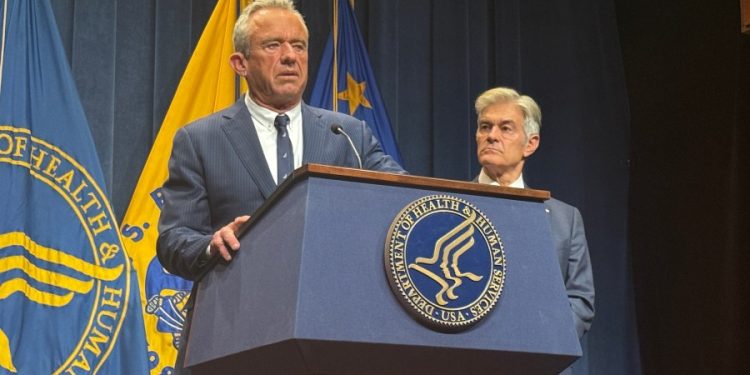Health and Human Services Secretary Robert F. Kennedy Jr. said there is not “sufficient” evidence that Tylenol causes autism, softening warnings he and President Trump have repeatedly made to discourage the medicine’s use by pregnant women and young children.
During a press conference Wednesday, Kennedy reiterated that pregnant women should use Tylenol only when “absolutely necessary.”
“We’ve all said from the beginning that the causative association between Tylenol given in pregnancy … is not sufficient to say it definitely caused autism, but it is very suggestive,” Kennedy said.
“And so there should be a cautious approach to it, and that’s why our message to patients, to mothers, to people who are pregnant, the mothers of young children, is consult your physician, and we have asked physicians to minimize the use to one that’s absolutely necessary,” Kennedy added.
The secretary’s comments came more than a month after he and Trump held a press conference in September to specifically warn pregnant women against taking the medication, without citing any scientific evidence.
Trump at the time repeatedly told women to “tough it out” rather than take Tylenol for fever or pain during pregnancy.
During a Cabinet meeting earlier this month, Kennedy linked circumcision and autism because of the administration of Tylenol, and he said anyone who opposed the theory was motivated by hatred for Trump.
“Anybody who takes the stuff during pregnancy unless they have to is, is irresponsible,” Kennedy said, while adding that anecdotes and statistics aren’t proof.
“We’re doing the studies to make the proof,” Kennedy said.
Kennedy’s remarks also came after Texas Attorney General Ken Paxton (R) sued the manufacturer of Tylenol, accusing the company of failing to warn consumers about the risk of taking Tylenol while pregnant.
The secretary’s most recent comments echoed what the Food and Drug Administration said in its note to physicians on the use of acetaminophen by pregnant women, as well as its public statement about changing the label on acetaminophen.
The agency noted that “a causal relationship has not been established and there are contrary studies in the scientific literature.”















